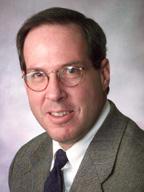A unique procedure involving the transplantation of human brain cells as a treatment for stroke was the focus of a Grand Rounds presentation Thursday afternoon at UNMC.
 |
Lawrence Wechsler, M.D. |
Lawrence Wechsler, M.D., professor of neurology and neurosurgery at the University of Pittsburgh School of Medicine, made the presentation. Dr. Wechsler is in Omaha as one of the speakers at a daylong conference Friday on acute stroke management. The conference is a collaborative event bringing together all the major hospitals in Omaha and Lincoln involved in acute stroke care.
UNMC and NHS are among the sponsors of the conference, which runs from 7 a.m. to 4:45 p.m. at the Omaha Marriott, 10220 Regency Circle.
In 2000, Dr. Wechsler was a co-investigator on a research team that studied the safety and feasibility of transplanting cultured neuronal cells in patients who had suffered a stroke and experienced a deficit in their motor skills. Twelve patients between the age of 44 and 75 received the cells. The patients had incurred their stroke between six months or six years prior to receiving their cell infusion. All had been stable for at least two months prior to the cell infusion.
A small hole was made in the skull of each patient at the stroke site. Neuronal cells were then infused directly into the damaged area of the brain. The cells were derived from a primitive tumor and were modified to become non-cancerous.
Using the European Stroke Scale, six of the 12 patients improved 3 to 10 points, and the average improvement in all patients was 2.9 points. Subsequent PET scans at six months showed improved fluorodeoxyglucose uptake at the implant site in some patients.
A second recently completed study of 18 patients again found no safety concerns. Improvement was seen in some measures of cognitive function and specific tasks involving arm function. Further studies are planned.
“We’re pleased to have Dr. Wechsler share his research at Grand Rounds and at the conference. This is exciting research that continues to evolve,” said Conference Director Pierre Fayad, M.D., who serves as the Reynolds Centennial Professor and chairman of UNMC’s department of neurological sciences. “It was an important first step, as it demonstrated that neuronal transplantation is feasible in stroke patients with motor deficits.”
The multidisciplinary conference, titled “Acute Stroke Management: Present Challenges and Future Hopes,” is designed for physicians; nurses; physician assistants; nurse practitioners; clinical nurse specialists; pharmacists; physical, occupational and speech therapists; and emergency medical technicians.
The conference is divided into two parts: the morning involves a plenary session, in which the speakers are visiting faculty with national reputations in their field. The afternoon is dedicated to six workshops in which some of the visiting faculty will interact with local health care professionals to address local issues.
In recognition of May being Stroke Awareness Month, Dr. Fayad said, UNMC/NHS will hold a free stroke screening May 16, from 11 a.m. to 2 p.m. in the Durham Outpatient Center second floor atrium (near the Cornerstone Gift Shop). The event is open to UNMC/NHS staff and the public. Educational materials also will be available. Participants will receive feedback on their risk for stroke, after taking a screening tool questionnaire and having their blood pressure measured.